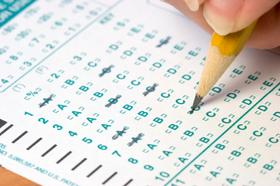Introduced in the early 2000s, the Common Core State Standards Initiative is designed to ensure that students across the country receive a similar quality of education. The initiative set specific standards for what students should know at the end of each grade with the goal of making sure that every student has an equal opportunity to attend college after high school.
Since its introduction, the Common Core State Standards Initiative has encountered a great deal of controversy. In some ways, it may benefit students to have a more structured education, regardless of where they go to school. In other ways, however, the standards don’t always work for every school or every student. One of the biggest problems with the initiative, however, is its emphasis on standardized testing.
As one of the major tenants of the Common Core State Standards Initiative, standardized testing has a significant impact on the nation’s educational system. Keep reading to learn more about how standardized testing affects teachers and teaching quality.
This video provides an evidence-based overview of some issues associated with standardized testing.
What is the Deal with Standardized Testing?
According to the Common Core website, the Common Core State Standards Initiative is, “a set of high-quality academic standards in mathematical and English language arts/literacy” that was created to ensure that “all students graduate from high school with the skills and knowledge necessary to succeed in college, career, and life”.
Having standards designed to increase the quality of education in the United States is a good thing – there are no arguments that the quality of education is not important. The problem arises when it comes to measuring the efficacy of those standards. In order to track student progress and gauge the success of the initiative, standardized tests were developed and administered to students throughout the country. All students receive the same test with the same answers and the results are supposed to paint a picture of how well each school is adhering to the standards and whether those standards are doing what they were designed to do.
So, what is the problem? The problem is that state or federal funding is often linked to a school or district’s performance on these standardized tests. This may not sound like an issue because, after all, if a certain educational system is doing its job, shouldn’t it be rewarded so it can continue to do so?
Theoretically, that sounds like a good thing but that is not how things tend to turn out. What ends up happening in many cases is that schools develop their curriculum around the Common Core standards but rather than focusing on the quality of education, they teach to the test – they only cover subjects that will be tested or focus more on teaching students the right answers to the test than they do on teaching them why those answers are correct.
How Does Standardized Testing Affect Teachers?
As you can see, theCommon Core State Standards Initiative has greatly impacted the educational system in the United States. While there are certainly supporters of Common Core at all levels in the educational hierarchy, there are many who dislike it as well. But what effect does the Common Core initiative have on the teachers themselves and on the quality of their teaching?
Many people who dislike the Common Core State Standards Initiative argue that too much time is spent preparing students for standardized tests instead of making sure that they actually learn and understand the material, so they can apply that knowledge throughout their education and their lives. The problem is that there is very limited research available on the effects of test preparation on teaching quality. In general, teaching quality is a very difficult thing to quantify and study.
In this episode of Origin of Everything, we ask the big question about why some American students take an average of 112 standardized tests between Kindergarten & Grade 12.
To give you an example of this particular problem in action, consider the results of two previously conducted research studies:
- In 2004, a New Jersey study found that teachers were using a wide variety of test preparation methods that involved repeating procedures and asking probing questions to improve understanding.
- More recently, in a 2012 study, the declining instructional quality was correlated with the rise of high-stakes testing, particularly in the weeks leading up to the test. It was discovered that teachers didn’t present challenging problems as often nor did they prompt students to conceptually understand solutions.
Hopefully, by now, you have a better understanding of the problem, but that still begs the question of the proper solution. In a new study, a pair of researchers conducted research to determine whether the issue might not just be with the standards but with the tests themselves – would a better test yield better results in terms of educational quality? Let’s take a closer look.
The Effects of Test Prep on Teaching Quality
In October 2017, a study conducted by researchers at the University of Maryland’s College of Education was published in Educational Researcher, a peer-reviewed journal. To conduct their study, the researchers utilized many hours of videotaped lessons taken from earlier unrelated studies – lessons that had already been coded for teaching quality using a scale developed by Heather Hill, a professor at Harvard University.
In this study, researchers videotaped lessons from five different school districts, some of which had low test scores and some of which had high scores. The results of the study revealed no correlation between more demanding test preparation lessons and higher teaching quality. In fact, they found that the quality of many teachers’ test preparation lessons was lower than when the same teacher was preparing students for a standardized test.
Another interesting discovery that came from this study is this: the largest quality gap between the instructional quality of a teacher’s regular lessons and the same teacher’s test-prep lessons was observed in a school district where the teaching quality was the highest overall. To put it another way, standardized testing actually decreased instructional quality, even in school districts where overall educational quality was high. In districts where overall instructional quality was low, test-prep lessons were not significantly lower in quality. They did not, however, raise instructional quality, either.
To quickly cover some of the specific results of the study, here are some key points:
- Rote instruction methods such as reciting times tables were correlated with a lower score than using multiple methods to solve the same problem or type of problem.
- The district with the highest teaching quality and test quality made heavier use of non-routine problems and asked students to write their answers in an open-response field rather than selecting from multiple choices.
- In districts where teaching quality and test quality were high, test-prep lessons had a much lower quality score than regular lessons – in districts with lower test scores, the decline was less steep.
To give you a brief idea of what kind of test-prep lessons are correlated with lower educational quality scores, here are some examples:
- Students spent too much time completing multiple-choice questions for which they received no feedback except for being right or wrong.
- Teachers spent more time teaching mnemonics than they spent making sense of the proper procedure for finding the answer.
- Some teachers dedicated a significant portion of class time (15 to 20 minutes) to discuss the formatting of the test, taking some of the focus away from the instruction itself.
But not every district had poor test-prep lessons. In some districts, lessons that utilized short-response practice questions or gave examples relevant to real-life improved understanding of the subject matter. The takeaway from these results seems to be that you cannot expect standardized testing alone to be the driver for change. Introducing or getting rid of standardized testing won’t necessarily improve instruction – there are too many factors to consider.
David Blazar, a co-author of the study and a professor at the University of Maryland’s College of Education, suggests that changing or removing the tests is unlikely to improve instruction or to actually change what happens inside the classroom. Rather, he argues that policymakers should be more concerned with finding ways to support teachers – better teachers mean better educational quality. Hopefully, the results of this study will be confirmed by future research to make the changes needed to improve and maintain educational quality in the U.S.
Questions? Contact us on Facebook. @publicschoolreview












